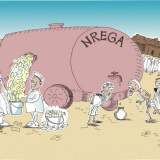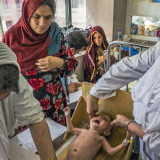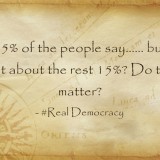MGNREGA : Questioning the fundamentals
MGNREGA is touted as largest ever employment programme ever in the human history. It is what that has given people in rural areas the ‘right to work’. The preceding sentence requires slight correction. It is what that has recognized the people’s fundamental right to work particularly in rural areas. This right is not just in terms of merely a scheme, but ‘right’ in its true sense being provided legal status by being an act. All those who ‘demand’ for work cannot be denied so, and in case of no availability within fifteen days there’s provision for unemployment allowance. Then there’s also provision for social audit. But things are not so simple. This is mainly because of scores of issues being faced since its inception till this day. This showcases loopholes both at the policy front and execution front.
In order to review and improvise committee headed by Mihir Shah too was appointed. The MGNREGA 2.0 was thus launched with 30 new works being listed under the act. While it’s a thumbs to the fact that sanitation works, poultry, watershed management and so forth have been included, this alone doesn’t solve the manifold issues.
Although employment provision doesn’t remain sustainable what has been pricking over the years is long sustaining problem of overdue payments. People may not be provided work for even 30-40 days but several times they have to wait for months together to receive their payment. One of the solutions that government devised to sort it out was ‘Direct Cash Transfer’ scheme. This has already been much criticized for not building a proper prior infrastructure before its launch such as expanding financial inclusion among others. It would have been better if much wider postal network would have been more concentrated upon for the purpose.
Even if we accept that for a scheme with such huge target population will have some discrepancies, the question then arises do we then have such a robust grievance redressal machinery in place? Shouldn’t we have active and accountable third party involvement for evaluation of the implementation of scheme in different areas? Are even people aware of where to go for non payment of their wages? Are they aware of using one of the most powerful tool in this regard of that of RTI? Do they know that just reading out muster roll from the website will bring in the transparency much needed and also highlight irregularities? There’s definitely a need to run workshops on making people aware of all such tools so as to use them effectively. Answers to above questions are mostly in dark and on other times foggy at the best.
As hinted somewhere above in our discussion, we further need to examine are we really been able to create sustainable job options for the youth through NREGA? Are the assets being created worthwhile enough? Why are we not providing option of skill upgradation or skill development with NREGA? Wouldn’t it diversify the scheme both for the individuals as well as be a social investment for the country? The scheme such as that of livelihood colleges of Chhattisgarh are worth mentioning with still some scope for further refinement so that such skill development processes do not mean merely industrial training instead something which helps in encashing upon community resources more judiciously. The NREGA scheme has been so designed to give more opportunities for women to get work. But do we have enough crèches around the work areas to look after the children? Are Anganwadi centers well equipped? Is the health insurance scheme enough to keep check on health related matters of workers?
There’s certainly a need to have such accountable system in place which provides in profound answers to all the above questions raised. The answers must not just be in the form of FAQs on the website or as a circular but should be visible on ground. Its only then people would be able to rejoice truly over the right they are entitled to.






good article